SWEDISH SOUTH ASIAN STUDIES NETWORK
Department of Economics, School of Economics and Management, Lund University:
Postal address: Nationalekonomiska institutionen, Ekonomihögskolan,
P O Box 7082, S-220 02 Lund, Sweden
Visiting address: Tycho Brahes Väg 1, Lund
Web page: http://www.nek.lu.se/eng.htm
Projects/Courses/PhD studies on or related to South Asia:
The Department of Economics in Lund offers several courses
on development economics in general, and specific courses such as gender
equality and development, and environment in poor countries where the
problems of South Asian countries are highlighted by Dr. Alia
Ahmad. The department has also over the years produced a number of master's
and undergraduate thesises including MFS (financed by Sida) on South Asian
countries – Nepal, Sri Lanka, Pakistan, Bangladesh and India.
Alia Ahmad is closely involved with the development of the Masters programme
in Asian Studies, established at Lund University in 2003, and she is regularly
teaching at the courses. More information on
the Masters Programme.
South Asia related research at the department
The Department of economics at Lund University offers no specific programme/seminar on South Asia, but through Alia Ahmad it nevertheless maintains a strong profile in South Asian Studies. Her research has mainly concentrated on the problems of a low income, labour surplus economy like Bangladesh.
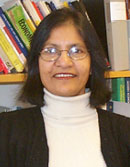 Associate Professor Alia
Ahmad has a research interest in Development economics, specialising
in population, gender and environmental issues; agriculture and rural
development; small industries and the informal sector in Asian countries:
social capital, institutions and common-pool resources. She has been involved
in research on other South and Southeast Asian countries as well, besides
writing two reports on Sri Lanka for the Swedish International Decvelopment
Agency, Sida – concerning institutional reforms and private sector
development, and also about regional inequality. Ahmad has also previously
worked for the Nordic Institute for Asian Studies, NIAS, on institutional
problems related to the management of groundwater in Vietnam.
Associate Professor Alia
Ahmad has a research interest in Development economics, specialising
in population, gender and environmental issues; agriculture and rural
development; small industries and the informal sector in Asian countries:
social capital, institutions and common-pool resources. She has been involved
in research on other South and Southeast Asian countries as well, besides
writing two reports on Sri Lanka for the Swedish International Decvelopment
Agency, Sida – concerning institutional reforms and private sector
development, and also about regional inequality. Ahmad has also previously
worked for the Nordic Institute for Asian Studies, NIAS, on institutional
problems related to the management of groundwater in Vietnam.
Dr. Ahmed retired in 2009. See also her personal
homepage
• In January 2002 Alia Ahmad received SEK 125 000 as a SASNET planning grant for networking on a research programme on ”State, Community and Resources”, along with Neelambar Hatti, Dept. of Economic History; and Pernille Gooch, Human Ecology Division, Lund University. The aim of the programme was to develop methodologies for research on institutional problems related to common-pool resources in Asia. The main activity consisted of organising a workshop on common-pool resources (CPR) in South Asia, inviting renowned scholars from India, Bangladesh and Nepal. A Workshop on CPR and institutions in South Asia was successfully held in Mysore, India, 27–29 August 2002.
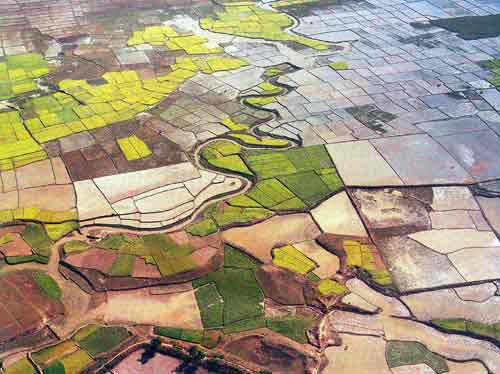 • Alia Ahmad is involved in a research project
on ”Community Management of Openwater
Inland Fisheries – A comparative study of cases from Bangladesh and
India”. It is a project born out of the larger programme
on ”State, Community and Resources”. It was given SEK 75 000
as a SASNET planning grant in January 2003.
• Alia Ahmad is involved in a research project
on ”Community Management of Openwater
Inland Fisheries – A comparative study of cases from Bangladesh and
India”. It is a project born out of the larger programme
on ”State, Community and Resources”. It was given SEK 75 000
as a SASNET planning grant in January 2003.
In December 2003 the project got a boost with a three-years (2004-06)
Swedish Research Links grant (SEK 330 000) from Sida and the Swedish Research
Council. See full list of Swedish Research Links
grants for the period 2004-06.
Project abstract: Openwater inland fisheries specific
management problems due to their common-pool resource characteristics.
In recent years, several NGOs and state initiatives in India and Bangladesh
are experimenting with community institutions in the fisheris sector for
meeting goals of efficiency, equity and sustainability. This study aims
1. to find out how far the new institutions have ensued successful collective
action among the poor, have received reduced poverty and achieved gender
equity; and 2. to explore the factors behind their success or failure.
Departing from current literature on common-pool resource management,
social capital and collective action, the study is based on primary data
from Tawa Matsya Sangha (TMS) project in Madhya Pradesh, India, and Community-based
Management of Fisheries supported by local NGOs and International organizations
(the WorldFish Center, DFID) in Bangladesh. The study will contribute
to knowledge on the interaction of traditional and new institutions supported
by external forces, and community´s ability to manage local resources
through collective actionand gender equity. Cooperation among researchers
will focus on conceptual/methodological and collection/analysis of data.
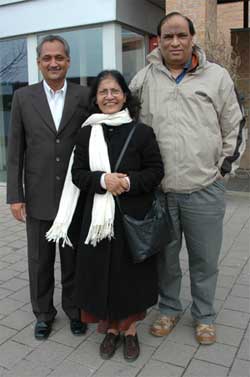 As a result of this research project, a three-days closed
workshop on "Community
Management of Openwater Inland Fisheries in Bangladesh and India"
will be held at the Department of Economics, Lund University on 14–17
March 2007. The participants to the conference include Mr. Muzaffar
Ahmed and Dr. Nurul Islam from WorldFish
Center in Bangladesh; Dr. Kazi Ali
Toufique from the Bangladesh Institute for Development
Studies, BIDS, in Dhaka (currently living
in Germany); and Prof. R.
Parthasarathy, Gujarat Institute
of Development Research in Gota, Ahmedabad, India. Besides Dr. Alia
Ahmad who organises the workshop, the Lund University representatives
are Dr. Ellen Hillblom from the Dept.
of Economic History, Iftekharul Haque,
student at the Masters Programme in South Asian Studies, and Prof.
Staffan Lindberg from the Dept.
of Sociology (also SASNET’s Director). Dr. Muhammad
Rab, also representing the WorldFish Center but currently living
in USA, was also supposed to participate but had to cancel his visit
to Sweden in the last minute.
As a result of this research project, a three-days closed
workshop on "Community
Management of Openwater Inland Fisheries in Bangladesh and India"
will be held at the Department of Economics, Lund University on 14–17
March 2007. The participants to the conference include Mr. Muzaffar
Ahmed and Dr. Nurul Islam from WorldFish
Center in Bangladesh; Dr. Kazi Ali
Toufique from the Bangladesh Institute for Development
Studies, BIDS, in Dhaka (currently living
in Germany); and Prof. R.
Parthasarathy, Gujarat Institute
of Development Research in Gota, Ahmedabad, India. Besides Dr. Alia
Ahmad who organises the workshop, the Lund University representatives
are Dr. Ellen Hillblom from the Dept.
of Economic History, Iftekharul Haque,
student at the Masters Programme in South Asian Studies, and Prof.
Staffan Lindberg from the Dept.
of Sociology (also SASNET’s Director). Dr. Muhammad
Rab, also representing the WorldFish Center but currently living
in USA, was also supposed to participate but had to cancel his visit
to Sweden in the last minute.
In connection with the workshop, SASNET organises a public seminar
about fish production and aquaculture in India and Bangladesh in
Lund on Thursday 15 March 2007. Prof. R. Parthasarathy
from India and Dr. Kazi Ali Toufique from Bangladesh participate
in this seminar (seen on the photo to the right,
along with Alia Ahmad). Dr. Kazi Ali Toufique will talk about ”Floodplain Aquaculture
in Bangladesh: A case of Enchantment or Disenchantment?", and
Prof. R. Parthasarathy about ”Governance Issues
in Natural Resources Management: The case of Fisheries in India”.
The seminar was organised in collaboration with
the Dept. of Economics, and was also part of a Spring 2007 SASNET lectures
series intended for the Lund University Masters students in Asian Studies
as part of their training.
In August 2008, Dr. Ahmad was awarded a SASNET planning grant
to organise a workshop titled ”Designing action research on the development of inland fisheries for poverty alleviation in Bangladesh” to be carried out in collaboration with BRAC, the largest non-governmental organization in Bangladesh. The workshop will be held at BRAC’s office in Dhaka 16–19 October 2008. The main collaboration partners are Dr. Zarina Nahar Kabir from the Dept. of Clinical Neuroscience, Occupational Therapy and Elderly Care Research (Neurotec), Karolinska Institutet Medical University in Stockholm; and Dr. Mahabub Hossain, Executive Director for BRAC, trained in development economics in the University of Cambridge, UK.
More information about the 2008 SASNET planning grants. ![]()
The purpose behind the workshop is to assist BRAC in innovating collective action in economic spheres in order to enhance/accelerate poverty reduction through inland fisheries development. It will draw lessons from previous international research and cooperation with South Asian countries regarding community based management of inland fisheries for poverty reduction. The workshop will concentrate on specific issues like identification of economic functions that the poor fisher groups in Bangladesh can undertake in order to enhance productivity and profitability of inland fisheries; evaluation of financial, managerial, institutional, social and physical/environmental feasibility of action research in this area; designing a strategy and concrete plan for intervention by BRAC. The participants will be invited from different organizations in Bangladesh with qualification and experience in multifaceted development.
The overall purpose of the workshop is to further strengthen research cooperation among researchers of South Asia and Swedish universities, a process that was initiated in 2002. Dr. Ahmad and her colleagues at that time started with a specific theme, namely community based management of inland fisheries and now they would like to continue this in order to make an impact on poverty in Bangladesh. Since they consider that poverty reduction goal can be achieved more effectively through action research, and NGOs (especially BRAC) have been playing an active role in Bangladesh both in the practice of development and in empirical research, the researchers consider BRAC’s initiative in community fisheries development for poverty reduction as promising.
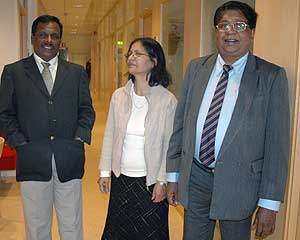 |
| Seminar in Lund on Tuesday 18 April 2006. From left to right: Dr. Chandrabose, Alia Ahmad and Sirimevan S. Colombage. |
• The department is also involved in an Indo-Swedish
research project on ”Microfinance
and Poverty Reduction in the Rural Sector: A Case Study of Sri Lanka”,
in collaboration with Prof. Sirimevan
S. Colombage (an eminent economist specialised
in macro-economic processes in Sri Lanka) and
Dr. Chandrabose (regional economist specialised
in the tea plantation economy), both from the Dept. of Social Sciences, Open
University,
Nawala, Nugegoda, Sri Lanka. In November 2002 this project, through
Alia Ahmad, was given a Swedish Research Links (Asian–Swedish
research partnership programme) grant on 550 000 SEK for three years
(2003-05) by Sida and the Swedish Research Council. Due to the tsunami
that hit Sri Lanka hard in December 2004 the project was given an
extension with one year, and will now be completed in the end of 2006. More
information.
Project abstract: The objective is to investigate the
effectiveness of microfinance in poverty reduction in the rural sector
of Sri Lanka. Using pluralist approaches of sample surveys and participatory
methods, it will examine how microfinance arrangements help to deal
with complex issues of information asymmetry and high transaction costs.
Quantitative and qualitative investigations will be carried out in the
selected villages of two economically deprived districts. Data will
be collected at three levels; household, organization, and community.
Longitudinal methods will be used to ascertain poverty dynamics. The
study will make a significant contribution in evaluating how far microfinance
has helped the poor to augment productivity, output, employment and
incomes and thereby to uplift their living standards. The Sri Lankan
team have conducted the study with analytical and empirical inputs from
the principal researcher in Sweden.
Prof. Colombage and Dr. Chandrabose visited Lund University in the middle
of April 2006, and SASNET organised a lecture with them on Tuesday 18
April. They then presented their findings from the research
project for masters and doctoral students from the Centre for
East- and South-East Asian Studies and the Dept. of Economics, Lund
University.
• In August 2003 Alia Ahmad was awarded 45 000 SEK
as a SASNET planning grant for a research project on ”Institutional
Reforms in the Health Sector of Bangladesh and India”. See
the full list of planning grants distributed in August 2003.
In November 2004 she was awarded a major two-years (2005-06) grant from
Sida/SAREC for the same project, now renamed: ”Institutional
problems in the primary healthcare sector in Bangladesh”.
More information.
The project is carried out in cooperation with Associate Professor
Neelambar Hatti, Dept.
of Economic History, Lund University, and researchers at ISEC, Institute
for Economic and Social Change, Bangalore, India (led by Dr. T
V Sekher), as well as at the Bangladesh Institute of Development
Studies, Dhaka.
Project abstract: In spite of some improvements in the health status
of the population in recent years, Bangladesh faces severe health problems
due to poor quality of primary healthcare and its unequal access.It is
often assumed that the lack of resources, both public and private is the
main reason. We argue that there is a problem of institutions as well
that leads to misallocation of limited resources and underutilization
of the existing facilities.The proposed research aims to carry out
an in-depth analysis of the institutional problems related to service
provision in primary healthcare of Bangladesh together with a comparison
with Karnataka, India as a successful case. Specifically, it will
focus on 1. decentralization of government functions in primary healthcare;
2. partnership between the government and the not-for-profit NGO sector;
and 3. the role of the community especially women in ensuring efficient
service delivery. Quantitative and qualitative data will be used.
In November 2006, Alia Ahmad received SEK 450 000 as a from Sida's Developing Country Research Council (U-landsforskningsrådet) for a new research project titled ”The Civil Society and Service Provision in the Health and Education Sector: A Comparative Study of West Bengal, India and Bangladesh”. More information about South Asia related Sida grants 2006.
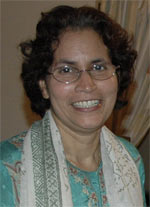 • Finally
Associate Professor Alia Ahmad (photo to the right) is also,
since 2002, involved in a research project on ”Social
Capital, Collective Action and NGOs in Bangladesh”,
about the role of non-governmental organisations (NGO’s) in promoting
social capital/collective action and poverty reduction in six villages
of Bangladesh (as a component of DFID-financed project on Livelihood
strategies in rural Bangladesh). The project is carried out in collaboration
with Dr. Rita Afsar, Bangladesh
Institute of Development Studies, Dhaka, Bangladesh, and Dr. Mahabub
Hossain, the International
Rice Research Institute, Manila, Philippines. The research includes
micro-level studies on social capital, never done before in Bangladesh
in spite of numerous previous studies of NGO’s.
• Finally
Associate Professor Alia Ahmad (photo to the right) is also,
since 2002, involved in a research project on ”Social
Capital, Collective Action and NGOs in Bangladesh”,
about the role of non-governmental organisations (NGO’s) in promoting
social capital/collective action and poverty reduction in six villages
of Bangladesh (as a component of DFID-financed project on Livelihood
strategies in rural Bangladesh). The project is carried out in collaboration
with Dr. Rita Afsar, Bangladesh
Institute of Development Studies, Dhaka, Bangladesh, and Dr. Mahabub
Hossain, the International
Rice Research Institute, Manila, Philippines. The research includes
micro-level studies on social capital, never done before in Bangladesh
in spite of numerous previous studies of NGO’s.
Ahmad and Afsar convened a panel on the subject, called ”Rural
Livelihood and Social Capital: The Case of Bangladesh and South Asia”
at the 18th European Conference on Modern South Asian Studies, held 6–9
July 2004 in Lund, Sweden. Read the panel
abstract.
 The
Research fellow and lecturer Therése
Hindman Persson presented her doctoral thesis on 13 April,
2002. Her PhD project was called ”Economic
Analyses of Drinking Water and Sanitation in Developing Countries”,
and was primarily based on research in Bangladesh. The project is carried
out in cooperation with researchers from the International Rice Research
Institute, Manila, Philippines, and the Bangladesh Institute of Development
Studies, Dhaka. See abstract
of the thesis.
The
Research fellow and lecturer Therése
Hindman Persson presented her doctoral thesis on 13 April,
2002. Her PhD project was called ”Economic
Analyses of Drinking Water and Sanitation in Developing Countries”,
and was primarily based on research in Bangladesh. The project is carried
out in cooperation with researchers from the International Rice Research
Institute, Manila, Philippines, and the Bangladesh Institute of Development
Studies, Dhaka. See abstract
of the thesis.
Therése Hindman Persson has focused on research on natural resources, the environment, health and development, and she runs a post-doc project called ”The Impact of Environmental Agreements on Trade and Growth”. The research is performed with financial support from the Swedish Council for Research in the Humanities and Social Sciences (HSFR), the Crafoord Foundation, the Royal Swedish Academy of Sciences, and the Foundation for Advancement of Economic Research at Lund University.
Since 2003 she is working for ECON, Center for Economic Analyses, a Norwegian economic knowledge-based firm, at their office in Stockholm. More information on ECON.
The Lund Institute of Economic Research
Within the framework of Lund
Institute of Economic Research – the research division of the
School of Economics and Management – Alia Ahmad and Therese Hindman
Persson are involved with a research programme on ”Sweden and
the World Economy”.
Head of this programme is Göte
Hansson, Professor of International Economics (as well as Dean of
the Faculty of Social Sciences, Lund University).
Description of the programme: International economics and development economics have a long tradition within the Department of Economics at the School of Economics and Management. The ”Sweden and the world economy programme”continues this tradition. It can be divided into two sub-programs: ”Internationalization and the Swedish Economy” and ”Sweden and Developing Countries”. Even though the individual projects within both sub-programmes frequently have their basis in Swedish issues, more general or theory-oriented issues are also analyzed within the two sub-programmes.
SASNET - Swedish South Asian Studies Network/Lund
University
Address: Scheelevägen 15 D, SE-223 70 Lund, Sweden
Phone: +46 46 222 73 40
Webmaster: Lars Eklund
Last updated
2010-11-22
